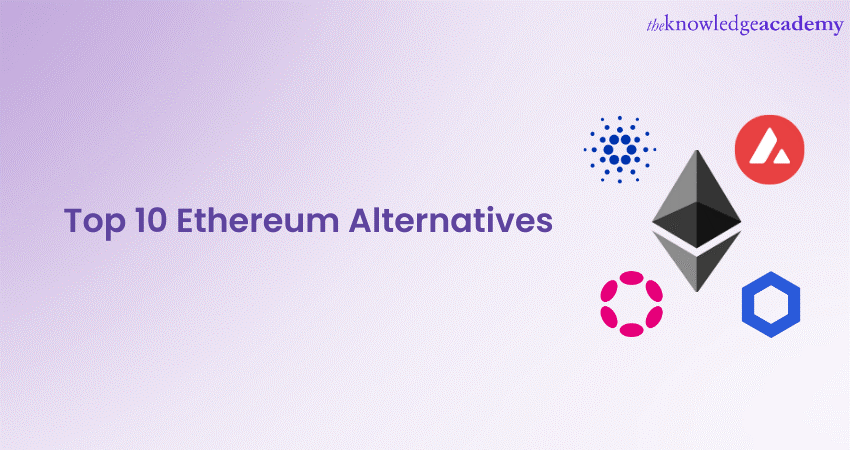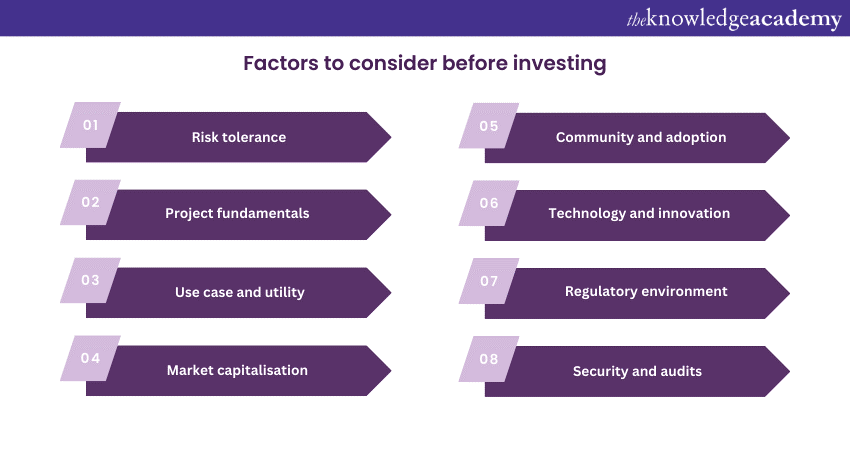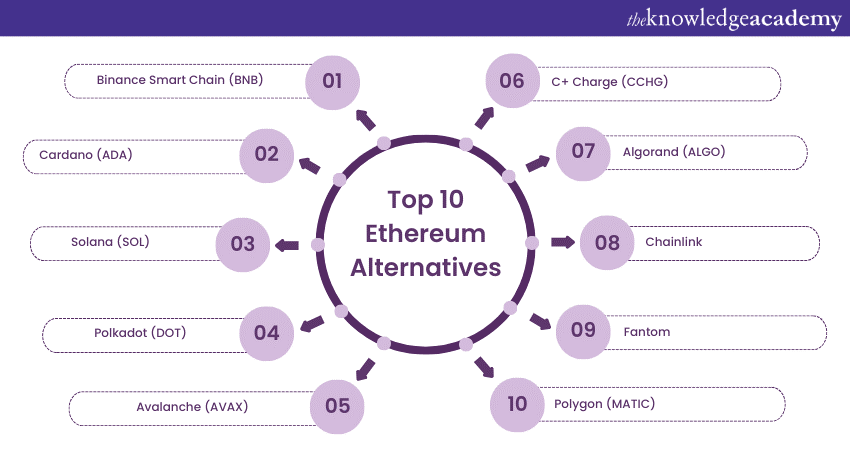We may not have the course you’re looking for. If you enquire or give us a call on +0800 780004 and speak to our training experts, we may still be able to help with your training requirements.
Training Outcomes Within Your Budget!
We ensure quality, budget-alignment, and timely delivery by our expert instructors.

Ethereum has gained significant recognition worldwide due to its large market capitalisation and active community. Despite its widespread popularity, there are several other Ethereum Alternatives available in the market that offer better returns at a lower initial investment cost.
Explore this blog to learn in detail about the top 10 Alternatives of Ethereum that you can invest in instead of Ethereum, exploring their distinctive qualities and providing valuable insights for investors seeking to diversify their Crypto portfolios.
Table of Contents
1) What are Ethereum Alternatives?
2) Factors to consider before investing
3) Top 10 Ethereum Alternatives
a) Binance Smart Chain (BNB)
b) Cardano (ADA)
c) Solana (SOL)
d) Polkadot (DOT)
e) Avalanche (AVAX)
f) C+ Charge (CCHG)
g) Algorand (ALGO)
h) Chainlink
i) Fantom
j) Polygon (MATIC)
4) Conclusion
What are Ethereum Alternatives?
Ethereum Alternatives, also commonly referred to as "Ethereum competitors" or "Ethereum killers," are Blockchain platforms designed to offer solutions to the limitations and challenges faced by Ethereum, the pioneering Blockchain network. Ethereum, launched in 2015, introduced the concept of Smart Contracts, enabling Decentralised Applications (DApps) to run on its platform. While Ethereum played a pivotal role in advancing Blockchain technology, it still faces several critical issues that have spurred the development of alternative Blockchain networks.
Explore our comprehensive Blockchain Training Course and unlock exciting opportunities and lead the way in the Blockchain revolution!
Factors to consider before investing
Investing in Cryptocurrencies, including Ethereum and its Alternatives, can be an exhilarating and lucrative experience. It is essential to approach the Crypto market cautiously and perform comprehensive analysis before making investment decisions. Here are several critical factors to consider before investing in Ethereum Alternatives or any other Cryptocurrency:

a) Risk tolerance: It is essential to assess your risk tolerance and financial situation before investing. Cryptocurrencies are known for their price volatility, and the market can experience significant fluctuations.
b) Project fundamentals: Understand the fundamentals of the Blockchain project associated with Cryptocurrency. Research the team behind the project, their experience, and their vision. Evaluate the project's whitepaper, roadmap, and technical documentation to gain insight into its goals, technology, and development plans.
c) Use case and utility: Determine the primary use case of the Cryptocurrency and whether it addresses a real-world problem or offers a unique solution. A clear use case can contribute to long-term value. Examine the utility of the Cryptocurrency within its ecosystem. Consider how it is used, whether it has real-world applications and whether it is essential for network operations.
d) Market capitalisation: Study the market capitalisation of the Cryptocurrency. A higher market cap indicates a more established and stable project but may also mean reduced potential for significant price gains. Understand the Cryptocurrency's circulating supply, as it can affect price dynamics and scarcity.
e) Community and adoption: Research the Cryptocurrency's community support and engagement. Active communities can contribute to network growth, adoption, and development. Investigate partnerships and collaborations that demonstrate the adoption or integration of Cryptocurrency in real-world use cases.
f) Technology and innovation: Analyse the underlying technology of the Blockchain platform and its scalability solutions. Assess whether it addresses the limitations of Ethereum or other existing platforms. Look for innovative features, consensus mechanisms, or governance models that set the Cryptocurrency apart from competitors.
g) Regulatory environment: Stay informed about the regulatory environment in which the Cryptocurrency operates. Regulations can impact the legality of holding, trading, or using specific Cryptocurrencies. Be aware of any legal restrictions or reporting requirements related to Crypto investments in your jurisdiction.
h) Security and audits: Verify the security measures and protocols to protect the Cryptocurrency and its users. Look for audits by reputable security firms and community transparency regarding security practices.
Explore Bitcoin and Cryptocurrency Course and acquire knowledge of the mechanics of bitcoin, Bitcoin mining, and anonymity.
Top 10 Ethereum Alternatives
Following are the top 10 Ethereum Alternatives:

1) Binance Smart Chain (BNB)
BNB Chain, previously called Binance Smart Chain, is a Blockchain platform developed by the renowned Cryptocurrency exchange Binance. The platform is highly regarded for its exceptional transaction speed and affordability, making it an ideal choice for DApps and DeFi initiatives.
With BSC's compatibility with Ethereum's Virtual Machine (EVM), developers can transfer their Ethereum-based apps seamlessly to the BNB ecosystem, making it a compelling alternative for those looking to reduce transaction fees. The platform's EVM compatibility guarantees that Ethereum developers can easily transition to Binance Smart Chain. BNB Chain enjoys strong support from its community, which is strongly focused on DeFi applications.
2) Cardano (ADA)
Cardano has been around for some time, and in 2015, it started the development of its Smart Contract. The project's primary objective is to establish the most efficient Blockchain solution based on scientific principles. As a third-generation Blockchain platform, Cardano prioritises scalability, sustainability, and interoperability. It leverages a unique Proof-of-Stake (PoS) consensus mechanism that sets it apart from other Blockchain solutions, and its development approach is firmly grounded in scientific research.
Cardano is supposed to be more scalable, faster and cheaper than Ethereum. Cardano already differed from Ethereum at the beginning in that it relied on proof-of-stake from the start. Even now, the Blockchain can be used for smart contracts and NFTs. However, Cardano is still in constant development. Cardano's development is divided into stages, each introducing significant improvements to the network.
3) Solana (SOL)
Solana is gaining attention for its exceptional transaction speed and low fees. Solana utilises a unique Proof of History (PoH) consensus mechanism that provides high scalability. It is designed for mass adoption, enabling low-cost transactions. Features such as Solana's Sealevel parallel Smart Contracts engine improve development efficiency.
It uses a novel consensus mechanism called Proof of History (PoH) combined with a PoS mechanism, resulting in high throughput. Due to its fast and cost-effective environment, Solana's ecosystem has attracted various DeFi projects and NFT marketplaces.
4) Polkadot (DOT)
Polkadot is a multi-chain network that focuses on interoperability between different Blockchains. It aims to create a "parachain" ecosystem where various Blockchains can connect, share information, and work together. Polkadot's unique architecture enables scalable and customisable Blockchains while maintaining security and compatibility with other networks.
Polkadot is designed in a way that allows multiple Blockchains to process transactions concurrently, which significantly enhances its scalability. It enables different Blockchains to share information and functionality, thereby promoting interoperability across the entire network. Polkadot provides shared security to all the connected parachains, ensuring a high level of security for the entire ecosystem.
5) Avalanche (AVAX)
Avalanche offers a platform for creating custom Blockchains, assets, and DApps. It utilises a unique consensus mechanism called Avalanche consensus, which provides sub-second finality and high security. The platform's flexibility and speed appeal to various applications, including DeFi, NFTs, and enterprise use cases.
With Avalanche, creating a customised Blockchain with custom rules is made possible using subnets. This Blockchain technology is highly scalable and supports a massive transaction rate, which is ideal for enterprise-level applications. Avalanche uses a consensus mechanism that is energy-efficient when compared to the traditional Proof of Work consensus.
AVAX is a Blockchain platform that focuses on providing decentralised solutions while maintaining high levels of security and scalability. The platform enables developers to deploy smart contracts, making it an attractive option for Ethereum Network Developers. Avalanche offers a viable Alternative to Ether, making it a versatile choice for Blockchain enthusiasts. Avalanche is a promising platform that aims to revolutionise decentralised technology with its robust features and capabilities.
Explore our Ethereum Developer Training course and get hands-on experience with Ethereum's smart contracts, DApps, and Blockchain development.
6) C+ Charge (CCHG)
C+ Charge (CCHG) is a P2P payment system specifically designed for EV charging stations. The platform offers a unique opportunity for democratising carbon credits. With C+ Charge, EV drivers can now conveniently pay for their charging sessions while earning carbon credits that can be used as rewards. This system incentivises EV drivers to reduce their carbon footprint by significantly lowering their driving emissions, contributing to a cleaner and greener environment.
C+ Charge offers much-needed transparency to an industry that needs it. Previously, electric vehicle drivers had difficulty finding out about available and functional charging stations before arriving, as well as the cost of charging. This innovative new Cryptocurrency application is helping to provide transparency and information to EV drivers.
7) Algorand (ALGO)
Algorand offers a pure PoS consensus mechanism for high throughput and low transaction costs. It is designed to be a scalable and efficient Blockchain platform for various applications. Algorand's focus on speed and efficiency makes it suitable for DeFi and institutional use cases and enables the creation of new financial products.
Algorand is a Blockchain network that offers a cost-effective solution for users as it has no gas fees. The network charges a minimum fee of only 0.001 Algos per transaction, making it more accessible for everyone. Algorand's simplicity lies in its ability to create fungible tokens, non-fungible tokens (NFTs), and security tokens with just one transaction without requiring any smart contract code.
Unlike Ethereum's Proof-of-Work (PoW) algorithm, which consumes a significant amount of energy, Algorand uses Proof-of-Stake (PoS) consensus mechanism, reducing Ethereum's energy consumption. Algorand has earned the label of the "green Blockchain" due to its carbon-negative approach.
Another benefit of Algorand's PoS algorithm is that users do not need to lock up their stake to participate in the system. Instead, anyone with one Algo can be selected to activate their validator. This feature makes Algorand more user-friendly and accessible to everyone, including those who might not have vast amounts of Algos to participate in the system.
8) Chainlink
Chainlink is a Blockchain platform that provides support for oracles, which are crucial components in Decentralised Applications. Among all the Blockchain networks, Chainlink is the most popular choice for this protocol. It enables the development of hybrid Smart Contracts that can seamlessly communicate with each other and access off-chain data from external sources.
Chainlink is highly versatile and can be integrated with various Blockchain networks, making it a top choice for developers of DeFi and Smart Contracts. Its multichain compatibility allows it to run on different Blockchain networks, providing a flexible and dynamic environment for developers to build their applications.
9) Fantom
Fantom (FTM) is a Blockchain technology that is designed to provide highly scalable solutions for Smart Contracts. With its fast throughput and rapid confirmation time for blocks, it is considered one of the quickest Blockchain networks in existence that utilises Smart Contracts. This technological prowess makes Fantom a top contender for those looking for an alternative to Ethereum in the years to come.
Its advanced features and capabilities position it as a robust and reliable Blockchain solution that can accommodate the needs of various industries and businesses.
10) Polygon (MATIC)
Polygon, formerly known as Matic Network, is a Layer 2 scaling solution for Ethereum. It enhances Ethereum's scalability, offering a wide spectrum of instruments and services for developers to build scalable DApps. Polygon's interoperability with Ethereum makes it an attractive choice for projects looking to alleviate Ethereum's congestion issues.
MATIC is a sidechain that is designed to work parallel to the main Ethereum Blockchain. This unique architecture allows MATIC to offer an independent yet interconnected ecosystem to its users, making it a reliable alternative to Ethereum. As the usage and adoption of Ether continue to increase, MATIC can also grow and expand alongside it, providing a scalable and efficient Blockchain solution to the community.
Conclusion
As Ethereum continues to refine its scalability solutions, these Alternatives offer exciting opportunities to address pressing challenges and explore untapped use cases. Whether it is Binance Smart Chain's cost-efficiency, Cardano's scientific approach, or Solana's blazing speed, each Alternative brings a unique perspective. In an ecosystem, Ethereum Alternatives shine as beacons of innovation, awaiting those ready to explore their potential.
Frequently Asked Questions
Upcoming Advanced Technology Resources Batches & Dates
Date
 Blockchain Training Course
Blockchain Training Course
Thu 6th Feb 2025
Thu 3rd Apr 2025
Thu 5th Jun 2025
Thu 7th Aug 2025
Thu 2nd Oct 2025
Thu 4th Dec 2025







 Top Rated Course
Top Rated Course



 If you wish to make any changes to your course, please
If you wish to make any changes to your course, please


